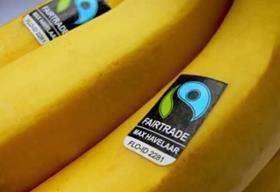
New actions on climate, textiles and gender are among a range of initiatives introduced by Fairtrade International over the past year and showcased in its annual report, released today (6 September).
The report, “Driving Sales, Deepening Impact”, highlights the organisation’s commitment to deliver more impact for farmers and workers and to enable them to have a fairer share in global supply chains.
The report reflects Fairtrade’s belief that the biggest driver of economic improvement is higher Fairtrade sales. 2015 saw significant growth in sales of Fairtrade products, including bananas with an increase of 12 percent.
Last year there were 1.6m farmers and workers across 75 countries, benefiting from an estimated €138m in Fairtrade Premium - the extra sum of money paid on top of the selling price that farmers and workers invest in business or community projects of their choice.
“Farmers and workers need to significantly scale up their Fairtrade sales if they are to escape from poverty,” said Marike de Peña, board chair of Fairtrade International. “Increased Fairtrade sales are the biggest driver of economic improvement, enabling producer organisations to secure the revenues they need for workers to be paid a living wage and for farmers and artisanal miners to earn a living income.”
However, the group noted that sales alone would not provide solutions to tackling inequality, creating opportunity and ending exploitation.
'Fairtrade is not naive about the challenges: many of the problems faced by farmers and workers are deeply ingrained after generations - sometimes centuries - of marginalisation and exploitation,' the group stated.
The annual report also shows how Fairtrade is responding to the needs of farmers and workers by ramping up its work on climate change, textile and cotton supply chains, gender equality and child protection.
“Fairtrade was born from a grassroots movement for trade justice,” said Marike de Peña. “We haven’t forgotten our roots, and we continue to campaign against policies that leave the most vulnerable farmers and workers unprotected. Our innovative work on textiles and climate change, for example, reflects our focus on advocacy and partnering with other organisations.”






No comments yet